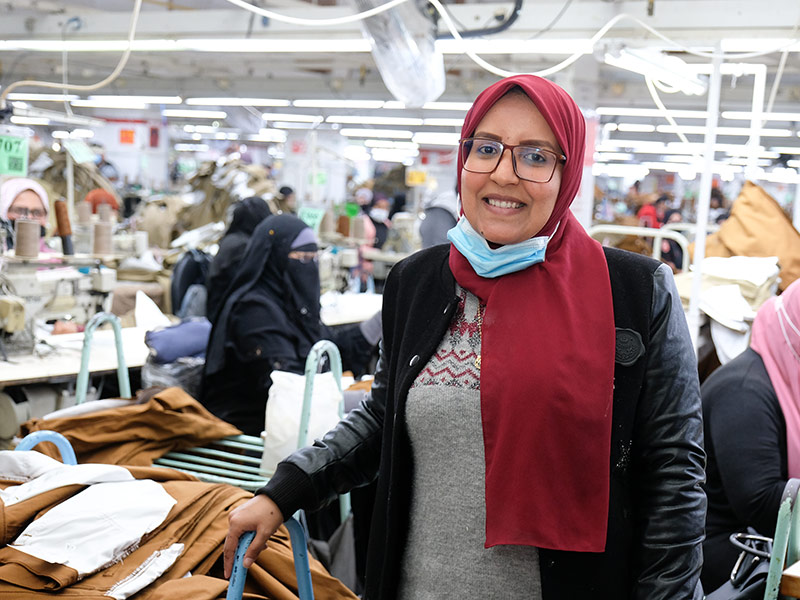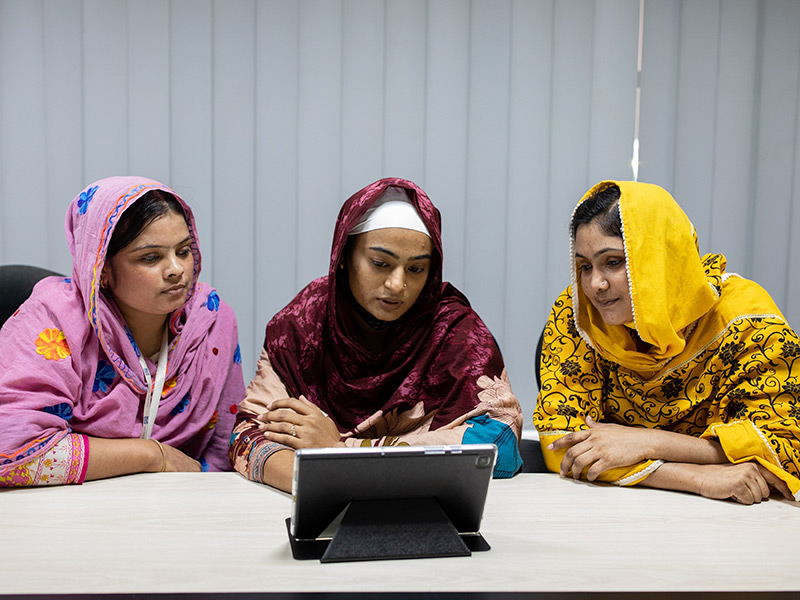
Photo courtesy of Paula Bronstein/Getty Images Reportage. Some rights reserved.
Authors
-
Peder Michael Pruzan-Jorgensen
Former Senior Vice President, BSR
-
Elissa Goldenberg
Former Manager, BSR
While progress on gender equality continues to advance too slowly, we are encouraged by signs that the private sector is taking an increasing role in making women’s empowerment a priority. For instance, more than 1,440 companies have signed the Women’s Empowerment Principles, suggesting that more and more companies are making women’s empowerment a strategic priority, with CEO-level support. In parallel, through our own work developing guidance on how to embed a gender lens in supply chain sustainability programs, we see more companies recognizing that resilient supply chains are intricately linked to the well-being and empowerment of women. And BSR’s HERproject has nearly 50 global active companies enhancing the lives of women working in their supply chains.
Despite these signs of progress, companies remain uncertain of how to grapple with the complex issue of gender-based violence. Without adequate attention and action, this issue will undermine any serious efforts to achieve gender equality.
Gender-based violence, which includes any act that results in, or is likely to result in, the physical, sexual, or psychological harm or suffering of women, is deeply rooted in gender power imbalances and adverse social norms that condone violence. When violence against women is perpetrated by intimate partners or happens in the workplace (whether in direct operations or global supply chains), it is an issue that concerns business. And the two are often linked: Intimate partner violence in the home may manifest as power imbalances in the workplace that facilitate sexual harassment. A staggering one in three women will experience some form of physical or sexual violence in her lifetime, usually by an intimate partner. That means most of us will have a close colleague who is a victim of physical or sexual violence.
For business, addressing gender-based violence in the workplace is a moral and business imperative; however, the damaging impacts of gender-based violence extend far beyond the workplace, affecting individuals, families, and communities. Given the complex origins of the problem and the far-reaching social consequences, many companies ask: “Is it our business?” We think it is. And we want to work with business on a global scale to address the problem.
The Cost to Business of Gender-Based Violence
The cost of gender-based violence to business is both direct and indirect. Violence against women prevents an economy from attaining its full potential, resulting in lower growth, lower taxe revenue, and greater expenses to healthcare, education, the justice system, and social services. For instance, one source estimates that globally, the costs of female homicide and violence by an intimate partner and sexual violence against women at more than US$110 billion per year. A Canadian study estimated the annual cost of domestic violence to the Canadian economy to $7.4 billion (Canadian dollars). It also affects business more directly through increased absenteeism, higher prevalence of presenteeism, and higher administrative and operating costs to compliance, training, and other programs. One research estimate puts the annual productivity loss of sexual harassment in a typical Fortune 500 company at US$6.7 million. Another study suggests that the Peruvian economy annually registers more than 70 million days of missed work because of violence against women.
In addition to the direct impacts, many businesses must also consider the risks—and costs—stemming from gender-based violence in their supply chains. While many global and international companies seek to mitigate the risks of human rights violations in their supply chains (through codes of conduct and associated assurance systems), our work on women’s empowerment shows that the absence of a gender lens means that such efforts are not effective at identifying, mitigating, or redressing gender-based violations. This exposes companies to risk of complicity in human rights violations, as well as risks to supply chain resilience and business continuity.
What Business Can Do
Effective business action to eliminate gender-based violence requires companies to consider the different ways they can prevent violence from occurring in their own operations, as well as how they can use their brands and reach to challenge the norms and stereotypes causing the problem in the first place. We believe companies can take action in three fundamental ways:
- Act to prevent gender-based violence within the company walls through HR-led policies, systems, training, communication, and dialogue, as well as by ensuring adequate complaint mechanisms are in place. Companies should also ensure market-facing business practices in marketing, communications, sales, and other units do not contribute to gender stereotyping and perceptions that influence societal values, norms, and attitudes that condone violence against women.
- Enable and support business and civil society partners throughout supply chains to eliminate gender-based violence in the workplace. For example, companies are partnering with their suppliers through BSR’s HERrespect program to address sexual harassment and violence in factories and on farms. And global facility services company, Sodexo, seeks to connect survivors of gender-based violence to employment opportunities within the company and with partners.
- Influence consumers, customers, business partners, community leaders, politicians, and regulators to raise awareness; influence attitudes and norms; mobilize collective action; and change laws, regulations, and administrative practices to prevent violence from occurring and to provide proper redress and support to survivors when violations do happen.
The basic premise of our act, enable, and influence framework is that effective, lasting solutions require a comprehensive and holistic approach. In this, influence must be viewed as an essential element—even as we recognize that some businesses may see this as going beyond their realm of responsibility. We believe that business has a tremendous role and opportunity—as well as a business case—to go further. In our view, business wields formidable powers through marketing and communications to influence consumer norms and attitudes as intimate partners, as community members, and as colleagues.
We are encouraged that more companies have started to address gender-based violence within and outside company walls. We need this. We also need more discussion and dialogue on the role of business, we need to know what works and what doesn’t, and we need find ways for collective action that involves collaboration among business leaders, engagement with policymakers, and close partnerships with local organizations. Therefore in 2016, BSR, in collaboration with Win-Win Strategies, launched Business Action for Women, a global platform to drive collective action on women’s empowerment. Gender-based violence is one of our focus areas, and we invite you to join as we take this global challenge on.
BSR’s latest sustainability insights and events straight to your inbox.
Topics
Let’s talk about how BSR can help you to transform your business and achieve your sustainability goals.







